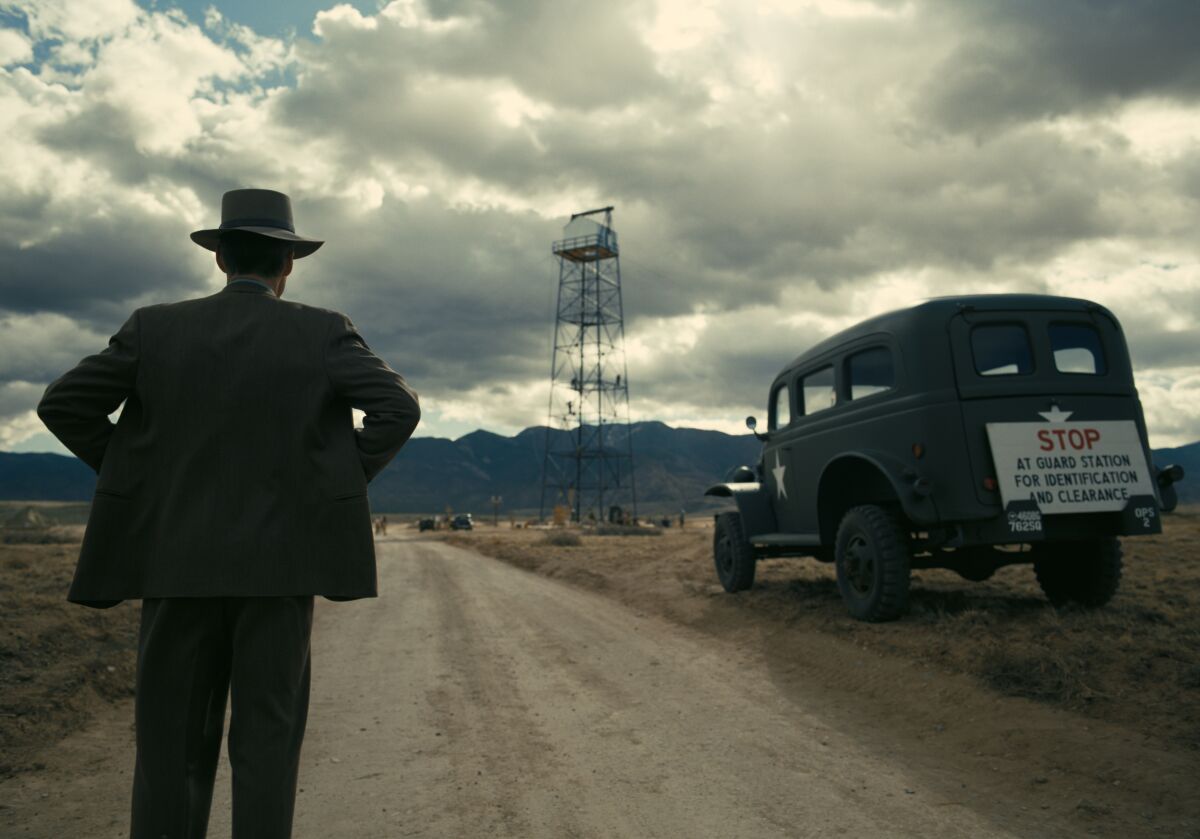You know a Christopher Nolan protagonist when you see him. Sleuth or showman, conquerer of space or invader of dreams, he is a man caught in a trap of his own intricate construction, lost in the maelstrom of a guilty obsession. He may not wear that obsession on his skin like Leonard Shelby, the amnesia-stricken avenger in “Memento,” or parade his demons in as symbolic a fashion as Bruce Wayne does in the “Dark Knight” trilogy. But whether he skulks about in film-noir shadows or blasts forth into dimensions unknown, every Nolan antihero risks becoming the architect of his own obliteration, a cruel fate that may well consume others in its wake.
None of which is to suggest that J. Robert Oppenheimer, the pioneering theoretical physicist who became known as “the father of the atomic bomb,” was ever an obvious choice of subject for this filmmaker. Much as Nolan may enjoy contemplating the end of the world, it’s telling that his past flirtations with the apocalypse — the uninhabitable Earth of “Interstellar,” the nuclear climax of “The Dark Knight Rises” — have been consigned to the relatively safe terrain (for now) of blockbuster fiction. With the exception of “Dunkirk,” his bravura thriller about a pivotal early chapter of World War II, Nolan has largely steered clear of historical events and famous figures. He practices a cinema of heady ideas, mind-churning metaphysics and rug-pulling narrative gamesmanship — not an intuitive fit with the more traditional conventions of the Hollywood biopic.
One of the many satisfactions of “Oppenheimer,” Nolan’s intellectually thrilling and morally despairing new film, is that it succeeds in locating some of those conventions within another of his ingeniously constructed narrative labyrinths. At first glance, Oppenheimer’s story would appear to follow an obvious rise-and-fall trajectory — an arc embedded in the very title of its source material, “American Prometheus: The Triumph and Tragedy of J. Robert Oppenheimer,” Kai Bird and Martin J. Sherwin’s Pulitzer Prize-winning 2005 biography. A straightforward adaptation might begin with the man’s meteoric ascent into the top ranks of American physicists, build to his leadership of the four-year, $2-billion Manhattan Project and climax with the horrific conflagrations of Hiroshima and Nagasaki. It would end, perhaps, with the bitter, disillusioning coda of Oppenheimer’s postwar career, during which he would speak out against nuclear proliferation but never express public regret for the bomb’s Japanese casualties.

Emily Blunt and Cillian Murphy in the movie “Oppenheimer.”
(Melinda Sue Gordon / Universal Pictures)
But Nolan, once again bending narrative and chronology to his will, is after something more elusive than a simple three-act trajectory. He is also less interested in reenacting scenes of mass death and devastation, none of which are depicted here, than in sifting through the bomb’s lingering geopolitical and psychic residue. For much of its three-hour running time, this swift and supercharged movie keeps its designs largely hidden beneath a series of formal eruptions. It leaps between time frames and perspectives, color and black-and-white, crowded classrooms and wide-open desert vistas, and even between aspect ratios, if you’re fortunate enough to see it in Imax. (Hoyte van Hoytema, Nolan’s longtime cinematographer, shot “Oppenheimer” on large-format 65-millimeter film and Imax 65-millimeter film; it’s the first picture to make use of black-and-white Imax stock.)
The point of these convulsions is hardly to confuse or overwhelm the viewer, as Nolan is often accused of doing, but rather to suggest something of its subject’s sweeping intellectual grandeur and complicated, often contradictory essence. Oppenheimer, played over four decades by a superbly restrained yet intensely expressive Cillian Murphy, is a polymath and a polyglot, a lover of art and literature as well as science. He is visionary and short-sighted, arrogant and convivial, an academic and an outdoorsman, a family man and a womanizer, a defender of the working class and a man of undisguised privilege. Trying to unpack a tricky quantum mechanics concept for a Berkeley student, he notes, “It’s a paradox, but it works,” an assessment that might just as well describe himself and this movie.
He is less a character to be dramatized, in short, than a series of equations to be continually rebalanced, if never fully solved. To that end, Nolan filters Oppenheimer’s mostly linear personal narrative through two framing devices, both set well after World War II. One is a private 1954 Atomic Energy Commission hearing where a somber Oppenheimer faces a tough interrogator (Jason Clarke) and the imminent revocation of his government security clearance. The other, shot in black-and-white and set in 1959, follows the former AEC Chairman Lewis Strauss (an outstanding Robert Downey Jr.), who’s waiting to be confirmed as President Eisenhower’s secretary of Commerce — a contentious process that becomes overshadowed by Strauss’ own past associations with Oppenheimer at Princeton.
All this narrative fragmentation, plus the jumble of names, titles and government acronyms, can be overwhelming at first, but Nolan and his editor, Jennifer Lame (“Hereditary”), intercut their threads with extraordinary propulsiveness and lucidity. Those who go in knowing the outcomes of the AEC proceedings and Strauss’ Cabinet bid will see past the red herrings that Nolan occasionally strews across the path of history. But even they may be held rapt by the coolly understated animus that binds Oppenheimer and Strauss — a tension to which Nolan keeps returning, and which Downey unpacks in a performance of beautifully coiled serpentine layers. Crucial to the characters’ adversarial dynamic is an enchantingly mysterious early interaction with Albert Einstein (Tom Conti), a moment that establishes Oppenheimer’s easy collegiality with his fellow great minds.
Soon we’re back in the exciting if tumultuous early days of his career, which take him across a great swath of 1920s Europe, where he hobnobs with field pioneers such as Niels Bohr (Kenneth Branagh) and befriends a fellow Jewish American physicist, Isidor Rabi (David Krumholtz), who foreshadows the rising tide of antisemitism worldwide. In one alarming episode from his time as a lost, wild-haired student at Cambridge, Oppenheimer reveals a capacity for irrational, intensely personal violence — a darkness that is being either tempered or triggered by his stunning visions of the subatomic world. In these wondrously transporting images of juddering waves and swirling particles, accompanied by the rumbling, surging, keening strains of Ludwig Göransson’s magnificent score, Nolan makes a rare leap into realms of pure cinematic abstraction.
In time, Oppenheimer has been ensconced as a professor at both Berkeley and Caltech, a corner of 1930s academia that turns out to be a hothouse of scientific discovery and political intrigue. Neat, fastidious and charming, he turns the heads of more than a few women, especially within the trendy Communist Party circles he frequents, and Murphy’s enigmatic reserve suggests a spirit of sexual and ideological promiscuity. Before Oppenheimer marries a thrice-divorced woman, Kitty (Emily Blunt, fierce), he is drawn to the self-destructive flame of a troubled paramour, Jean Tatlock (Florence Pugh, also fierce), generating flashes of erotic heat never before approached by Nolan’s cinema. Oppenheimer’s romantic indecision echoes his own refusal to put out politically, as he declines to join the Party despite his own avowed left-wing sympathies — a pose of high-minded neutrality that will prove his success and his undoing.

Cillian Murphy in the movie “Oppenheimer.”
(Universal Pictures)
He is, to paraphrase one of the script’s heavier-handed thematic contrasts, a theorist rather than a practician, hopeless in a lab but commanding in the classrooms where much of the movie’s paper-waving, blackboard-scrawling action unfolds. But it’s precisely Oppenheimer’s ability to envision the bigger picture that makes him singularly qualified to lead the government’s top-secret Manhattan Project, aimed at building a weapon powerful enough to end the war and possibly all wars. And it’s Oppenheimer who will successfully propose moving his family and many others to Los Alamos, N.M., where a top-secret laboratory and soon an entire town is built to accommodate a closely-monitored staff of thousands.
Some sly military-industrial complex humor creeps in as Oppenheimer, clad in his signature gray waistcoat and rumpled porkpie hat, leads this massively complicated undertaking at the surly behest of Col. Leslie R. Groves (a gruffly amusing Matt Damon). These two characters’ odd-couple head-buttings (previously dramatized to lesser effect in the 1989 movie “Fat Man and Little Boy”) here set the tone and rhythm for a project that thrives on a spirit of scholarly disagreement and tetchy troubleshooting.
“Oppenheimer” is both an unerringly focused character study and, somehow, one of the year’s most sprawling ensemble pieces, with vivid turns from Josh Hartnett, Rami Malek, Olivia Thirlby, Casey Affleck and Dylan Arnold, among many others. Benny Safdie makes a memorably sweaty and argumentative Edward Teller, an early proponent of the hydrogen bomb who has his own shifty role to play in Oppenheimer’s postwar tribulations. And while this is a primarily male-driven story, which speaks as much to the inequities of history as it does to Nolan’s dramatic predilections, Blunt brings startling force to the role of a woman who shames her faithless husband with a loyalty that surpasses all reason.
Through it all, Nolan remains the consummate Hollywood theorist and practician, someone who realizes his grandiose conceptual ambitions with a stubbornly hands-on, ground-level command of cinematic craft. He and his production designer, Ruth De Jong (“Nope”), seem energized by their physical re-creation of the Los Alamos site, which we see being constructed from the ground up as barbed-wire fences roll out and military vehicles roll in. There’s palpable urgency and mounting dread to this world-building, and also a striking contrast with Van Hoytema’s interior-dominated visuals, which turn human faces and confined spaces into giant-screen landscapes. There’s also a splash of “There Will Be Blood” in Nolan’s vision of an indelible American darkness taking root in western soil, especially when a 100-foot tower springs from the earth, soon to be engulfed by the fiery cloud of the world’s first plutonium implosion device.

Cillian Murphy in the movie “Oppenheimer.”
(Universal Pictures)
That fateful 1945 “Trinity” test, dramatized with a mix of queasy suspense, seat-rattling spectacle and fascinating logistical details, tears a hole in the fabric of the movie — a rupture that it’s both prepared and unprepared to fill. As Oppenheimer is confronted with the gravest consequences of theory becoming practice, a story of human intelligence and enterprise becomes one of monstrous, clockwork-like betrayals, some sweepingly systemic and some intimately personal. Part of the subtle greatness of Murphy’s performance is the way his character seems to empty out in the story’s later passages, as though succumbing to a kind of moral and psychological paralysis. “Now I am become Death, the destroyer of worlds,” he murmurs after the Trinity explosion, quoting from the Bhagavad Gita. The real Oppenheimer may have never expressed remorse over Hiroshima and Nagasaki, but the movie never lets its Oppenheimer forget them, especially in one shuddering, blood-chilling sequence that transforms a public moment of triumph into an indictment.
Nor can Oppenheimer forget the still greater destruction that may yet be unleashed, a prospect that his typically naive and high-minded insistence on “international cooperation” will do nothing to dispel. Nolan conveys that warning with somber gravity, if not, finally, the cathartic force that our current headlines, full of war and nuclear portent, would seem to demand. Not for the first time, the demonstrative cleverness of his storytelling can seem too precise, too hermetically sealed and engineered, for a sense of raw collective devastation to fully take hold.
That might be a rare failing of this extraordinarily gripping and resonant movie, or it could be a minor mercy. Whatever you feel for Oppenheimer at movie’s end — and I felt a great deal — his tragedy may still be easier to contemplate than our own.
‘Oppenheimer’
Running time: 3 hours
Rating: R, for some sexuality, nudity and language
Playing: Starts July 21 in general release
Stay connected with us on social media platform for instant update click here to join our Twitter, & Facebook
We are now on Telegram. Click here to join our channel (@TechiUpdate) and stay updated with the latest Technology headlines.
For all the latest Art-Culture News Click Here
